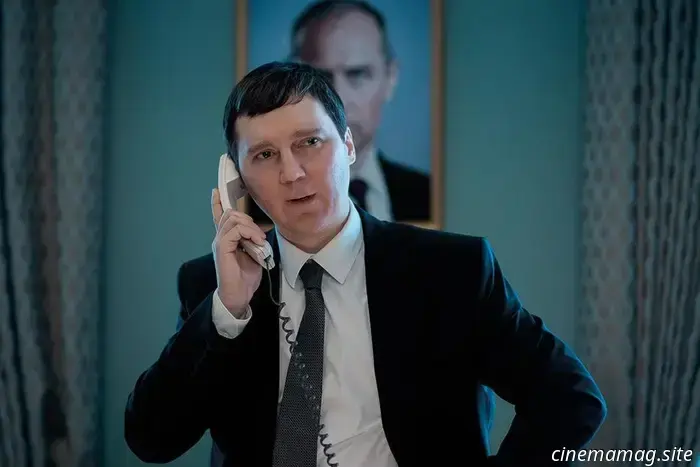
Venice Review: The Wizard of Kremlin Demonstrates a Cynical and Irrelevant Perspective on Vladimir Putin’s Russia.
In April 2022, two months following Russia's invasion of Ukraine, Italian author and political commentator Giuliano da Empoli released a fictionalized narrative detailing Vladimir Putin’s rise, narrated through the perspective of his advisor. The Wizard of Kremlin quickly became popular as audiences sought to comprehend the rationale behind Russia's wartime actions, while overlooking that it was under Putin’s regime that misinformation was legitimized as a political tool. By 2024, Olivier Assayas was set to direct a film adaptation of the book, with support from Disney+. Consequently, The Wizard of Kremlin was nominated for the Golden Lion in the Venice Film Festival’s Competition lineup, featuring Paul Dano in the lead role of Vadim Baranov, a representation of Putin's shadowy associate Vladislav Surkov.
Da Empoli’s narrative employs an imagined dialogue between himself and Baranov as a storytelling technique. Assayas adopts a similar approach by introducing a narrator. Roland (Jeffrey Wright), a writer who, akin to da Empoli, has written an essay on Baranov, finds himself in the back of a car headed to a mansion outside Moscow. Upon arrival, he receives a warm greeting from Baranov, a courteous and soft-spoken gentleman whose turtleneck is as high as his bookshelves are filled with classic and avant-garde literature. From his comfortable home, this so-called “New Rasputin” recounts his life from childhood through the cultural peak of the ’90s and his entry into politics, with his words manifesting into visually rich sequences reminiscent of the book.
Whether he serves as a good narrator is debatable. He excels in phrasing and structure, but his reliability remains unquestioned. The fascination with an éminence grise lies in their morally ambiguous nature, fluid rhetoric, and the power dynamics they create; however, Baranov only provides a thorough yet very dry, unexamined narration. The romantic subplot with the punkish-turned-socialite Ksenia (Alicia Vikander) lacks the depth to justify his warlock moniker. The way Ksenia is introduced at convenient moments implies her role is merely to alleviate the masculine tensions––her presence as the sole woman in the film is even more detrimental than the absence of women altogether. Even when she attempts to confront Vadim about his lack of courage, her comments feel hollow and her critique weak, underutilizing Vikander’s vibrant energy.
On the other hand, Jude Law delivers a remarkable performance as Vladimir Putin. He embodies the Russian leader with a stony demeanor and just the right amount of prosthetics to accentuate his signature pout, which is effectively a scowl. Much like Putin, Law encapsulates the character in his appearance: his eyes seem diminished due to makeup that enables swift, darting movements during significant parts of conversations, creating an eerie resemblance to the real individual. Signs of Putin’s pettiness and arrogance ensure Assayas won’t have to worry about the audience confusing Law’s compelling performance with evoking empathy. In certain notable moments, Putin and Baranov cling to each other as lifelines; although no vulnerability is displayed, there is a sense of them softening slightly.
Similar to Ksenia, Roland’s role is disappointingly simplistic: akin to a puppet, this alleged expert remains silent and ineffective. In striving to remain true to da Empoli’s book, the film’s overall narrative structure reveals itself as flimsy and unconvincing––one quickly realizes that a dialogue among political advisor and expert could never be so bland and uneventful. Baranov’s tales are filled with clichés either articulated by him or echoed by others, including notions that “no one is ever safe in Russia,” “if you don’t seize power, power seizes you,” or about the “need to create something, someone new” and his desire to be “part of” his times, “not just a witness.” While cinema can (and should) use clichés when dramatizing history, the current context of Russia's war with Ukraine demands higher stakes from Assayas and his team than your typical historical thriller.
Why choose fiction? It appears this question went unasked. Perhaps it was seen as irrelevant. Adam Curtis’s 2022 documentary Russia 1985-1999: TraumaZone covered much of what The Wizard of Kremlin––an accessible, over-explained segment of history––offers viewers. Since the latter aims to be a genre piece, it proudly claims its fiction. Baranov’s occasional hesitance is deliberately woven into a few scenes where he consults Putin, yet the film ultimately grapples with the same dilemma as its peers: does it prioritize character empathy over moral clarity? Audiences were wary of Ali Abbasi’s The Apprentice due to the prospect of Donald Trump as its protagonist, but at no point does The Wizard of Kremlin exhibit any ambivalence towards its central character. By failing to challenge Baranov as
Other articles
 In the trailer for season 3 of Billy the Kid, the outlaw transforms into a legend.
MGM+ has released a trailer for the third and final season of its Western drama series, Billy the Kid. In this season, Sheriff Pat Garrett is on a mission to apprehend the famous outlaw, while Billy opts to remain in New Mexico, seeking the justice he feels has slipped away from him. Season 3 features the return of […]
In the trailer for season 3 of Billy the Kid, the outlaw transforms into a legend.
MGM+ has released a trailer for the third and final season of its Western drama series, Billy the Kid. In this season, Sheriff Pat Garrett is on a mission to apprehend the famous outlaw, while Billy opts to remain in New Mexico, seeking the justice he feels has slipped away from him. Season 3 features the return of […]
 Venice Review: An Outstanding Dwayne Johnson Mellowes Benny Safdie’s The Smashing Machine
The Smashing Machine is a film rich in emotion and passion. It also demonstrates a deep affection for its subjects, including the individuals involved and, for better or worse, the industry they contributed to. The film is inspired by a 2002 HBO documentary of the same title and features a prominent performance by Dwayne "The
Venice Review: An Outstanding Dwayne Johnson Mellowes Benny Safdie’s The Smashing Machine
The Smashing Machine is a film rich in emotion and passion. It also demonstrates a deep affection for its subjects, including the individuals involved and, for better or worse, the industry they contributed to. The film is inspired by a 2002 HBO documentary of the same title and features a prominent performance by Dwayne "The
 The Top 30 Film Schools in the U.S. and Canada, 2025
As we began to create our newest list of the 30 Best Film Schools in the U.S. and Canada, we initiated the process with a fundamental question: Which schools will assist you in reaching your goals?
The Top 30 Film Schools in the U.S. and Canada, 2025
As we began to create our newest list of the 30 Best Film Schools in the U.S. and Canada, we initiated the process with a fundamental question: Which schools will assist you in reaching your goals?
 Michael Bay's Cinematic Framework: Insights on Scale, Motion, and Energy - MovieMaker Magazine
Capturing people's attention nowadays seems almost impossible. Even quality content is missed if it doesn't connect right away. However, certain things just
Michael Bay's Cinematic Framework: Insights on Scale, Motion, and Energy - MovieMaker Magazine
Capturing people's attention nowadays seems almost impossible. Even quality content is missed if it doesn't connect right away. However, certain things just
Venice Review: The Wizard of Kremlin Demonstrates a Cynical and Irrelevant Perspective on Vladimir Putin’s Russia.
In April 2022, just two months following Russia's invasion of Ukraine, Italian author and political commentator Giuliano da Empoli released a fictionalized narrative detailing Vladimir Putin's rise from the perspective of one of his advisors. The Wizard of Kremlin quickly gained popularity as readers sought to understand the reasoning behind Russia's actions.
